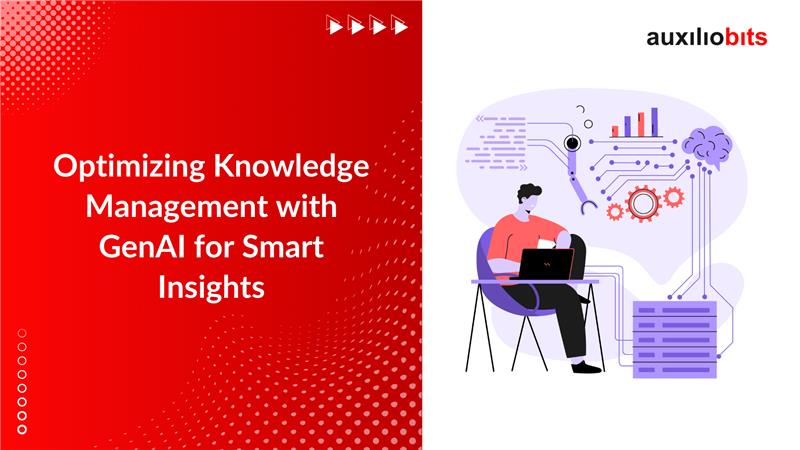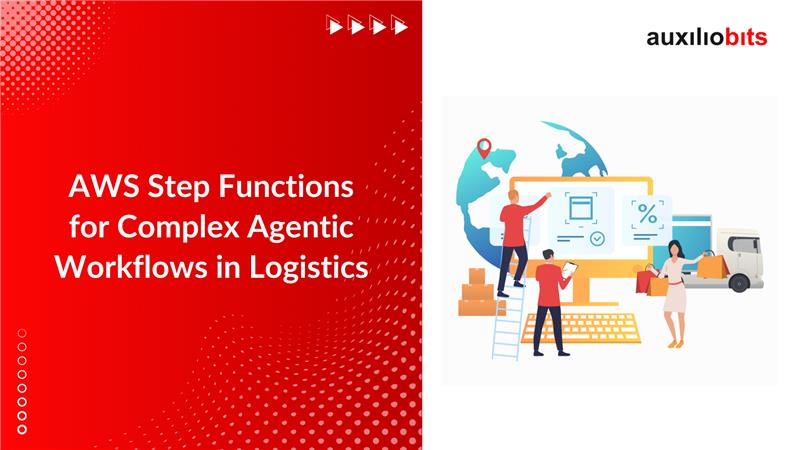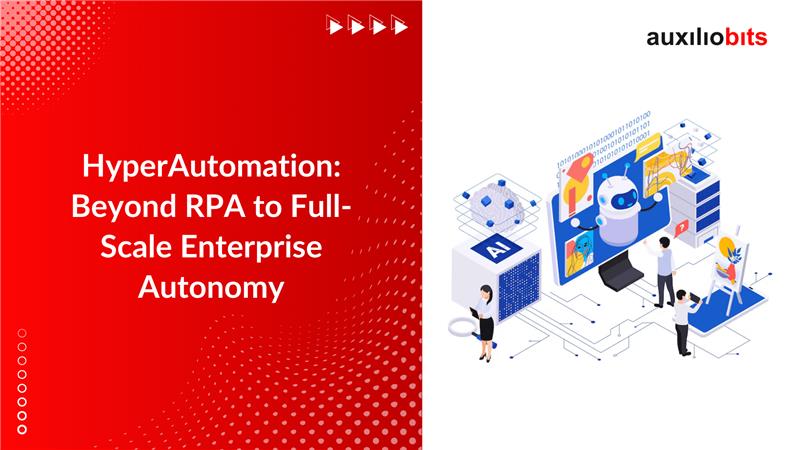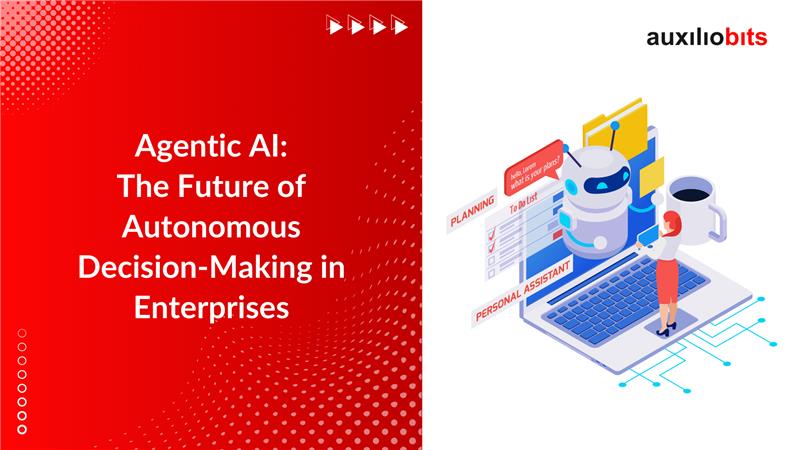
When it comes to organizational success, effective knowledge management is a vital factor. Organizations produce massive datasets, including structured and unstructured data from customer interactions, reports, and emails. Traditional knowledge management systems tend to compromise, leading to missed opportunities, inefficient decisions, and fragmented knowledge. If you are a person who’d prefer not to experience such problems, think no more and explore the possibility of using generative AI. It can generate, translate, and extract from enormous data sets with the capabilities of powerful machine learning algorithms. Pattern recognition, summarization, and context understanding: generative AI transforms information into precious knowledge. In contrast to traditional systems based on human intervention, generative AI makes knowledge extraction and sharing into automated processes, making company information flow more streamlined with zero delay.
Artificial intelligence utilizes automated content creation, recovery, sharp search, and real-time knowledge structure output. It helps virtual assistants and chatbots answer consumer questions, enhancing client relations and staff output. Generative artificial intelligence can also create reports, summarize lengthy papers, and suggest pertinent materials for sound decision-making. We can talk about the almost endless benefits of generative artificial intelligence. Knowledge discovery is faster for firms, partnerships are boosted, and knowledge sharing is transformed. Moreover, the capacity of generative artificial intelligence makes the knowledge basis current and relevant.
What is Knowledge Management?
Knowledge Management (KM) is the structured approach of capturing, organizing, analyzing, and sharing information within an organization. It involves processes, tools, and strategies that ensure the proper knowledge reaches the right people at the right time, empowering employees to make informed decisions and enhance overall productivity.
At its core, KM is about managing explicit knowledge (documented information like manuals, reports, and databases) and tacit knowledge (experiential insights and expertise stored in employees’ minds). Effective KM systems bridge the gap between these two types, making valuable insights accessible across the organization.
Key Components of Knowledge Management:
Below are some of the key components you should know about knowledge management:
1. Knowledge Creation and Capture:
This involves generating new insights through research, innovation, and problem-solving. Organizations also capture knowledge from everyday operations, customer interactions, and employee experiences.
2. Knowledge Organization:
Using taxonomies and metadata, information is structured into repositories, databases, or knowledge management systems (KMS). This ensures easy searchability and accessibility.
3. Knowledge Sharing and Collaboration:
Employees share insights through portals, internal wikis, collaborative platforms, and training programs. Encouraging a knowledge-sharing culture is vital for KM’s success.
4. Knowledge Application:
KM ensures knowledge is applied to solve problems, improve workflows, and support strategic decisions. By making insights actionable, businesses gain a competitive edge.
5. Knowledge Evaluation:
Continuous assessment of knowledge repositories ensures relevance, accuracy, and up-to-date information. Feedback loops help refine and optimize knowledge assets.
Benefits of Knowledge Management:
- Enhances decision-making by providing reliable, real-time information.
- Promotes collaboration and knowledge sharing across departments.
- Preserve institutional knowledge, reducing knowledge loss from employee turnover.
- Speeds up problem resolution and innovation through accessible insights.
The Role of GenAI in Optimizing Knowledge Management
Generative AI (GenAI) transforms Knowledge Management (KM) by automating complex tasks, extracting insights, and enhancing knowledge accessibility. By leveraging Natural Language Processing (NLP), machine learning, and advanced data modeling, GenAI enables organizations to unlock the full potential of their knowledge repositories. It offers real-time insights from structured data (e.g., databases and reports) and unstructured data (e.g., emails, chat logs, and documents).
Let’s explore how GenAI optimizes key areas of KM:
1. Data Classification
GenAI uses NLP algorithms to analyze data, automatically classify it, and apply relevant tags. It understands the context and meaning behind the data, eliminating the need for manual tagging. This results in faster and more accurate data retrieval. Employees can access the most relevant information without sifting through endless files, enhancing productivity and decision-making.
2. Content Generation
GenAI can generate summaries, reports, knowledge articles, and even FAQs from large datasets. Identifying key insights and structuring them into readable formats reduces the burden of manual content creation. Organizations experience improved knowledge dissemination. Employees can access concise summaries or detailed reports tailored to their needs, accelerating knowledge sharing and learning.
3. Semantic Search
Unlike traditional keyword-based search engines, GenAI-powered semantic search understands user intent and context. Analyzing query language and interpreting meanings provides more relevant and accurate search results. Employees spend less time searching for information and more time applying insights. This enhances productivity and reduces information silos across departments.
4. Predictive Insights
GenAI identifies patterns, trends, and correlations within data. It can predict market trends, customer behaviors, and operational risks, offering actionable recommendations based on data analysis. Decision-makers gain access to data-driven insights, enabling informed, strategic choices. Businesses can proactively address challenges and seize new opportunities.
5. Knowledge Gap Analysis
GenAI assesses existing knowledge repositories to detect gaps or outdated information. It recommends areas for content enhancement or suggests generating new resources. Organizations ensure continuous learning and maintain a comprehensive, up-to-date knowledge base. This supports employee growth and fosters innovation.
Key Applications of GenAI in Knowledge Management
Generative AI (GenAI) redefines Knowledge Management (KM) by automating tasks, delivering intelligent insights, and enhancing knowledge accessibility. By using advanced algorithms and Natural Language Processing (NLP), GenAI streamlines how organizations create, retrieve, and utilize knowledge. Here’s how GenAI powers key applications within KM:
1. Intelligent Content Generation
GenAI can produce high-quality content, including reports, summaries, manuals, and documentation. Analyzing structured and unstructured data generates coherent, contextually accurate content tailored to the organization’s needs. For example, it can summarize lengthy reports into actionable insights or create knowledge-based articles using historical data.
Benefits:
- Automates time-consuming content creation.
- Ensures consistent and accurate documentation.
- Reduces the workload for knowledge workers.
This empowers employees to focus on higher-value tasks while still maintaining up-to-date documentation.
2. Contextual Search and Retrieval
Traditional search systems rely on keyword matching, often delivering irrelevant results. In contrast, GenAI-powered search engines use semantic search algorithms to comprehend the intent and context behind user queries. It understands natural language and provides accurate, meaningful results from vast knowledge repositories.
Benefits:
- Faster and more relevant search results.
- Reduced time spent on information retrieval.
- Enhanced productivity for employees.
This application mainly benefits industries with complex, domain-specific data, such as the legal, healthcare, and finance sectors.
3. Personalized Knowledge Recommendations
GenAI learns from users’ behaviors, preferences, and historical interactions to deliver personalized recommendations. By suggesting relevant documents, reports, and learning resources, it tailors knowledge delivery to individual needs.
Benefits:
- Improves user experience with customized knowledge pathways.
- Increases knowledge retention and learning efficiency.
- Supports decision-making by offering the most relevant insights.
This is particularly effective in large enterprises with vast knowledge bases, as it ensures users quickly find the most applicable information.
4. Data Synthesis and Analysis
GenAI can aggregate data from multiple sources, synthesize it, and provide a unified insights view. By identifying patterns, correlations, and anomalies, it offers actionable intelligence. Organizations can use these insights for predictive analysis, competitive intelligence, and strategic planning.
Benefits:
- Facilitates data-driven decision-making.
- Detects trends and opportunities in real time.
- Provides a comprehensive understanding of operations.
For example, companies can predict customer behavior, optimize processes, and identify market trends using GenAI’s synthesized data analysis.
5. Knowledge Graph Generation
GenAI creates knowledge graphs that visually map relationships between data entities, concepts, and insights. These graphs represent complex knowledge ecosystems by connecting data points across structured and unstructured information and understanding of organizational knowledge.
Benefits:
- Identifies gaps and redundancies in data.
- Enables better collaboration and information sharing.
Knowledge graphs are helpful in sectors such as management, healthcare, and financial services, where relationship mapping is essential.
Benefits of Implementing GenAI in Knowledge Management
Implementing Generative AI (GenAI) in knowledge management (KM) offers transformative benefits that significantly enhance how organizations create, store, access, and utilize information. Businesses can unlock actionable insights, streamline operations, and drive innovation by leveraging AI-powered automation, data analysis, and natural language understanding. Here’s a closer look at the key benefits of integrating GenAI into KM systems:
1. Enhanced Decision-Making
GenAI empowers leaders with real-time insights by analyzing vast amounts of structured and unstructured data. It identifies patterns, trends, and correlations that might otherwise go unnoticed. By offering data-driven recommendations and predictive analytics, GenAI aids in strategic decision-making.
For example, in the financial sector, GenAI can analyze market trends to provide investment insights, while in healthcare, it can recommend treatment options based on patient history and medical data.
Outcome: Faster, well-informed decisions that drive business growth and mitigate risks.
2. Increased Efficiency
Manual knowledge management processes, such as document analysis, data extraction, and report generation, are often time-consuming and prone to human error. GenAI automates these tasks, streamlining workflows and reducing operational costs.
For example, GenAI quickly processes large datasets, generates summaries, and even drafts reports using natural language processing (NLP) and machine learning, enabling employees to focus on higher-value tasks.
Outcome: Reduced manual effort, faster operations, and improved department productivity.
3. Improved Knowledge Access
Traditional search engines rely on keyword matching, often delivering irrelevant results. GenAI enhances knowledge access through contextual search, understanding user intent, and providing precise, relevant information. It uses semantic search algorithms to interpret queries and retrieve data from vast repositories.
For example, employees no longer need to access numerous documents to find what they need. Instead, GenAI delivers the most accurate and contextual results, ensuring quicker problem-solving and more informed decision-making.
Outcome: Faster access to relevant information, improving productivity and user satisfaction.
4. Continuous Learning
GenAI facilitates continuous learning by maintaining an up-to-date knowledge base. It analyzes feedback, tracks knowledge gaps, and suggests learning resources tailored to individual users. Additionally, AI-powered systems can generate interactive learning content, automate training modules, and recommend personalized learning paths.
For example, organizations continually refine and expand their knowledge to promote a learning culture and keep employees updated on the latest information.
Outcome: A well-informed workforce equipped with the latest knowledge and skills.
5. Competitive Advantage
Organizations that use GenAI for knowledge management gain a significant market share. With faster access to actionable insights, they can respond to market changes proactively, innovate rapidly, and optimize operations. GenAI also enables predictive analytics, helping businesses anticipate customer needs, emerging trends, and potential risks.
For example, a GenAI retail company can analyze customer purchase patterns to predict product demand, adjust inventory, and optimize supply chain operations.
Outcome: Improved market responsiveness, accelerated innovation, and sustained competitive advantage.
Conclusion
Generative AI revolutionizes knowledge management by automating content generation, enhancing search accuracy, and delivering actionable insights. Organizations implementing GenAI effectively will benefit from improved decision-making, operational efficiency, and competitive advantage.
Contact us today to learn how we can help you implement GenAI for innovative knowledge management solutions. We are more than happy to assist you.






